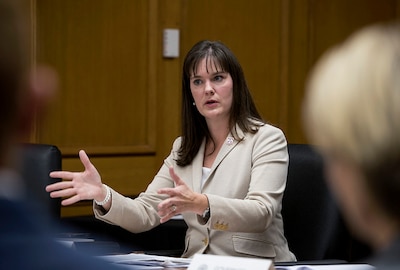Exasperated with another round of testing problems in Tennessee public schools, state lawmakers have used their bully pulpit to rail against Education Commissioner Candice McQueen for her management of the state’s beleaguered standardized test.
Last week, they called her in to the State Capitol for a two-hour grilling about online snafus and a reported cyber attack that got TNReady testing off to another rocky start. Several called for McQueen’s resignation.
The next day, lawmakers dramatically stepped in and passed legislation so that this year’s scores mostly won’t count on student grades or in important decisions about teachers and schools, essentially gutting the state’s vaunted accountability system, at least for this year.
Few legislators have been willing to talk about the elephant in the room, but several education advocates have.
Just four years ago, PARCC was to be the vehicle for Tennessee students to begin testing online using questions aligned to Common Core academic standards for math and English language arts. At the time, Tennessee was a Common Core state and had been working for several years toward sharing an online test through a multi-state consortia known as PARCC, short for the Partnership for Assessment in College and Career Readiness.
But in April 2014, six months before testing was supposed to begin and amid political backlash over Common Core, the legislature voted to pull out abruptly from the partnership.
The decision, which was against the wishes of Gov. Bill Haslam and former Education Commissioner Kevin Huffman, set the state’s collision course toward TNReady. It meant that Tennessee had to develop a new test — pronto — and find a new company to administer it. Measurement Inc., a small North Carolina-based firm, was hired for $108 million in November 2014.
Generally, it takes at least two years to create a test and prep for launch. State lawmakers gave Measurement Inc. about a year, with the first testing starting in the fall of 2015 for some high school students. But the real test came in February 2016. That’s when most students in grades 3-11 logged on and the platform collapsed on the very first day, the victim of too many students trying to test at one time with too few computer servers.
McQueen, who had replaced Huffman after the deal was inked with Measurement Inc., subsequently scrubbed tests for most students that year and fired the state’s testing company. A few months later, she turned to Minnesota-based Questar to pick up the pieces for $30 million annually beginning in July of 2016. Things went slightly better the next year with TNReady, though not perfectly.
This year, a lot was riding on Tennessee officials to get TNReady right in a return to statewide online testing. But when more technical problems erupted on the first day this spring, McQueen immediately became the target for blame.

“We do want to have that one throat to choke,” she told reporters who asked who should be held accountable, before adding that “there’s lots and lots of people involved.”
During a legislative hearing that same day, Rep. Mark White reminded his colleagues about their pivotal 2014 decision to pull out of the testing consortia.
“General Assembly, we had some ownership in this,” said the Memphis Republican, who also voted to exit the partnership. “We had a testing company originally four years ago …[but] we pushed back against the commissioner and the Department of Education and said we don’t want PARCC for political reasons. … We fussed about Common Core and we fussed about the standards.”
Tennessee wasn’t alone. In 2014, it was one of 18 states that comprised the consortia. The partnership is now down to four states — Illinois, Maryland, New Jersey, and New Mexico — along with Washington, D.C., and schools operated by the U.S. Department of Defense and the Bureau of Indian Education.
"General Assembly, we had some ownership in this."
Rep. Mark White, R-Memphis
The exodus was due to mostly Republican complaints of federal overreach by the Obama administration for incentivizing states to adopt the controversial Common Core standards. But superintendents back home were also fearful of the switch to computerized testing.
Online testing has gone fairly smoothly for those that stayed in the partnership, and PARCC is now the only assessment fully approved by the U.S. Department of Education.
“States that have continued with the program now have four years of longitudinal data measuring student performance and growth over time,” said Arthur VanderVeen, who leads New Meridian, the company that manages the partnership.
The shared test also has been a money saver.
Hanna Skandera, New Mexico’s former secretary of education, said economies of scale allowed her state to cut testing costs by more than a quarter by sticking with PARCC. More importantly, she said, the test has been an effective measuring stick.
“This is not about a brand. It’s about quality of assessment,” said Skandera, who formerly chaired the partnership’s board. “PARCC allowed us to measure the things we cared about — critical thinking, higher expectations aligned to higher education. In New Mexico, it’s been a big step in the right direction.”
Below, you can view a timeline of Tennessee’s testing journey from PARCC to TNReady.

